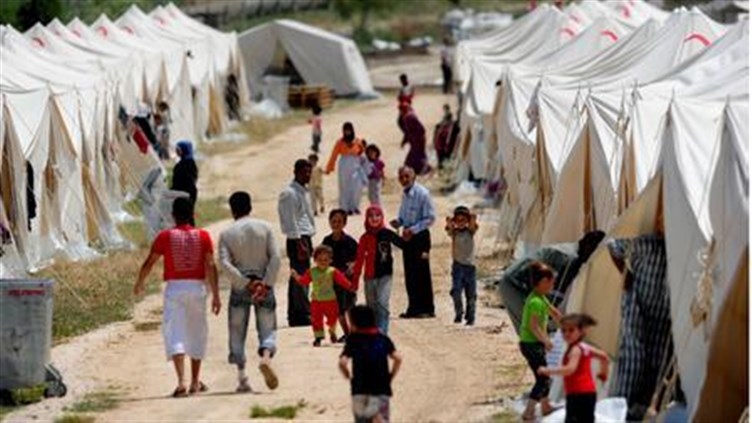
[ad_1]
Lebanese Labor Minister Kamil Abu Sulaiman has pledged to simplify work permit procedures "to the extent possible under Lebanese law, which is inevitable" held ongoing contacts to resolve the problem resulting from the Ministry of Labor's decision on Palestinian labor in Lebanon. Prime Minister Saad Hariri met with the Minister of Labor, Kamil Abu Sulaiman, in the presence of the Lebanese-Palestinian dialogue committee chairman, Hbadan Mneimneh, and the former minister, Ghattas Khoury, on theme of Palestinian work in Lebanon.
After the meeting, Abu Suleiman said: "We have discussed the implications of the Ministry of Labor's plan for Palestinian refugees, and it is recognized that there is a special situation for Palestinian workers in relation to foreign workers. recognized by Lebanese law, he emphasized that "the purpose of the research was to facilitate the obtaining of the necessary documents to obtain the action of the Palestinians on work permits imposed by Lebanese law and that this research was He said: "I will hold a meeting next week with the Ministry team and the Palestinian brothers to discuss their concerns and simplify as much as possible the procedures under Lebanese law, which can not disappear.
At that time, the general strike and the total closure of the Ain el-Hilweh camp continued to protest against the decision of the Ministry of Labor and demand its withdrawal. A Security Council meeting, chaired by Southern Governor Mansour Daou, is being held in Saray Sidon, attended by senior security, military and judicial officials from the South, to discuss Palestinian movements Protestants in Saïda against the decision of the Minister of Labor and its impact on the general situation.
Hundreds of Palestinian refugees protested last week in reaction to what they saw as a violation of their rights after the closure by the Ministry of Labor of Palestinian-owned institutions and the arrest of Palestinians. other persons for not having complied with the legal requirements. According to the latest official census, Lebanon hosts 174,000 Palestinian refugees. The protests led the Ministry of Labor to pledge to facilitate Palestinian work permits. But it is unlikely to include the Syrians. The Lebanese who oppose the presence of Syrian refugees in Lebanon say they fear their survival in the country, as was the case for the Palestinians.
At the same time, the Lebanese authorities are cracking down on illegal foreign workers and preventing them from influencing Lebanese labor, according to the official announcement, but activists and non-governmental organizations have lobbied on them to expel them from Lebanon. Street advertising posters have been on the street for weeks and the Ministry of Labor has called on employers to hire Lebanese and give them a month to install their foreign workers.
Employers are justified by the fact that their workers do not have a work permit because they need tedious procedures and may not be approved for Syrians. While the authorities justified their decision by preserving the interests of Lebanese workers. Marilyn Atallah, head of the Department of Foreign Labor at the Ministry of Labor, said that thousands of Lebanese are looking for employment opportunities and that the ministry has taken the initiative of "that the situation has deteriorated a great deal and the people have screamed ". She added on the sidelines of a ministry visit to several areas, including Al-Hamra Street in Beirut, to check for irregularities, that the campaign "targets all foreign workers who work irregularly and do not target a nationality." specific".
These measures are accompanied by a systematic media and political campaign against Syrian refugees. Lebanese officials are calling on the international community to send them back to their country and blame them for the deteriorating economic situation in Lebanon and the decline in employment opportunities.
The director of research of the Issam Fares Institute for Public Policy and International Affairs, Nbader Ybadin, who oversees research on Syrian refugees in the region, said in statements to the news agency that these measures suggested that "there is a clear strategy to create more and more pressing factors for Syrians".
");
//}, 3000);
}
});
//$(window).bind('scroll & # 39;);
$ (window) .scroll (function () {
if (alreadyLoaded_facebookConnect == false) {
alreadyLoaded_facebookConnect = true;
// $ (window) .unbind (& # 39; scroll & # 39;);
// console.log ("loaded scroll");
(function (d, s, id) {
var js, fjs = d.getElementsByTagName (s)[0];
if (d.getElementById (id)) return;
js = d.createElement (s); js.id = id;
js.async = true;
js._https = true;
js.src = "http://connect.facebook.net/en_US/all.js#xfbml=1&appId=148379388602322";
fjs.parentNode.insertBefore (js, fjs);
} (document, 'script', 'facebook-jssdk'));
// pre_loader ();
// $ (window) .unbind (& # 39; mousemove & # 39;);
// setTimeout (function () {
// $ (# boxTwitter & # 39;) .html ("Tweets by @tayyar_org");
//}, 3000);
var scriptTag = document.createElement ("script");
scriptTag.type = "text / javascript"
scriptTag.src = "http://www.tayyar.org/scripts/social.js";
scriptTag.async = true;
document.getElementsByTagName ("head")[0].appendChild (scriptTag);
(function () {
$ .getScript ("http://www.tayyar.org/scripts/social.js", function () {});
});
}
});
//$(window).load(function () {
// setTimeout (function () {
// // add content returned to a newly generated script tag
// var se = document.createElement (& # 39; script & # 39;);
// se.type = "text / javascript";
// //se.async = true;
// se.text = "setTimeout (function () {pre_loader ();}, 5000);";
// document.getElementsByTagName (& # 39; body & # 39;)[0].appendChild (se);
//}, 5000);
//});
[ad_2]
Source link